Nubian goats are a breed of dairy goats known for their distinctive appearance, high milk production, and friendly temperament. They are thought to have originated in North Africa, and they are one of the oldest known dairy breeds. They were developed in England by crossing native African and Middle Eastern goats with local breeds.
Gentle giants compared to their cousins
Nubian goats are larger than Nigerian Dwarf goats but smaller than some other dairy breeds. They have a distinctive appearance with long, pendulous ears that hang down the sides of their head. Nubians also have a Roman nose, which is a convex or straight profile. These goats come in a wide range of coat colors and patterns. Common colors include solid black, red, and tan, as well as various combinations and patterns.
Nubian goats are renowned for their high milk production and the quality of their milk. They have a higher butterfat content compared to many other dairy breeds, making their milk excellent for cheese and butter production. On average, a Nubian doe can produce almost an entire gallon of milk in a day.
Known for their friendliness, Nubians have very outgoing personalities. They are often considered affectionate and enjoy interaction with their owners. Their social nature makes them suitable for various purposes, including 4-H projects and as pets. With proper care, Nubian goats can live up to 12 to 15 years or even longer.
Nubian goats are prolific breeders and have a longer breeding season than some other dairy breeds. The gestation period is approximately 150 days, and they typically give birth to multiple kids. These goats are primarily kept for their milk production, but they can also be used for meat. Additionally, their friendly nature makes them suitable for various agricultural and educational purposes.
Regular veterinary care, vaccinations, and attention to common goat health issues, such as parasite control and hoof care, are crucial for maintaining the health and well-being of Nubian goats.
- Pasture and forest vegetation including vines, leaves, tree nuts and fruit
- Hay
- Alfalfa
- Fruit and vegetables year round, pumpkin and squash in the fall
- Supplemental mixture of commercial goat feeds
- Multicolored, white, cinnamon, tan, black with spots
- Horned or naturally hornless
- Average sized goat with a social to affectionate temperament
- Adults range from 100-175 pounds
- Great tolerance to the Florida weather except rain
- 1 doe can produce up to 1 gallon per day
- Milk is high in butterfat and protein
- Excellent ice cream, cheese, butter and rich ingredient in desserts
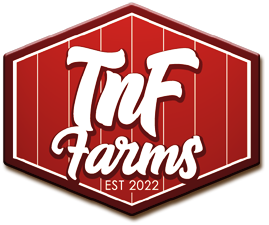
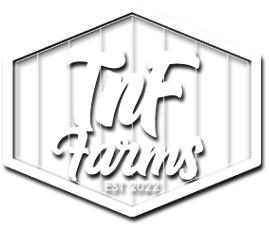
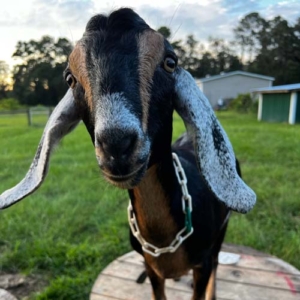
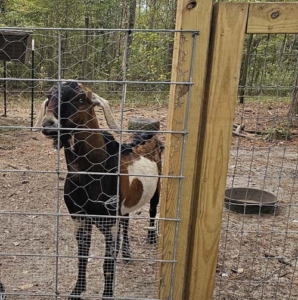
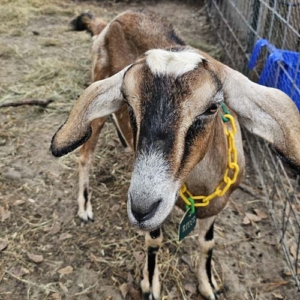
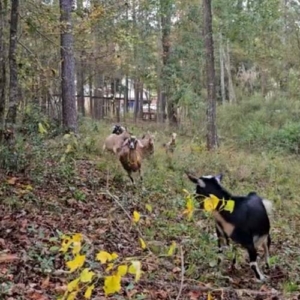
Farm Animals Make Life Better
/in American Guinea Hogs, Farm Animals, Florida Living, Nigerian Dwarf Goats, Nubian Goats, Poultry/by KaitlynI am a frequent visitor to TnF Farms, usually about once a month for a few days. I have been visiting the last few years since Tim and Faith moved to Tallahassee to start their farm. I am no stranger to farm life, as I have had horses growing up, and I much prefer it over city living. During my visits, I help Faith with farm chores, lend a helping hand on projects, become a goat midwife, and get my much-needed farm fix. I have always had a deep connection with animals in general, but there’s just something inherently special about farm animals.
Goat Friendly Florida Trees
/in Farm Animals, Florida Living, Homesteading, Nigerian Dwarf Goats, Nubian Goats/by FaithFlorida’s diverse and warm climate provides an excellent opportunity for goat farmers to integrate fruit trees into their farms. When selecting fruit trees for a goat farm in Florida, it’s essential to consider not only the climate but also the nutritional benefits these trees can offer to the goats. Here’s a more in-depth look at some suitable fruit trees:
Should You Grow Ryegrass?
/in American Guinea Hogs, Farm Animals, Homesteading, Nigerian Dwarf Goats, Nubian Goats, Poultry/by TimBeyond its role as a forage crop, rye grass plays a crucial role in environmental conservation. Its ability to prevent soil erosion, particularly on slopes or vulnerable terrain, has made it a preferred choice for cover cropping. As a cover crop, ryegrass forms a protective layer over the soil, reducing the risk of erosion and promoting soil health. Additionally, its quick growth makes it an effective ground cover in lawns and pastures, providing an aesthetically pleasing green carpet. Whether utilized for livestock feed, erosion control, or ornamental landscaping, ryegrass stands out as a resilient and adaptable grass species with multifaceted benefits.